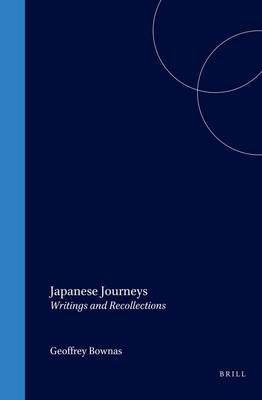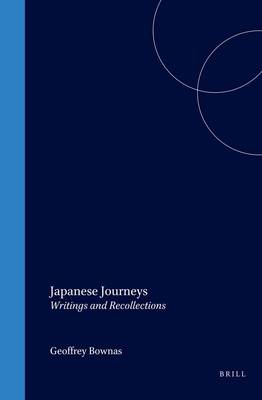
Bedankt voor het vertrouwen het afgelopen jaar! Om jou te bedanken bieden we GRATIS verzending (in België) aan op alles gedurende de hele maand januari.
- Afhalen na 1 uur in een winkel met voorraad
- In januari gratis thuislevering in België
- Ruim aanbod met 7 miljoen producten
Bedankt voor het vertrouwen het afgelopen jaar! Om jou te bedanken bieden we GRATIS verzending (in België) aan op alles gedurende de hele maand januari.
- Afhalen na 1 uur in een winkel met voorraad
- In januari gratis thuislevering in België
- Ruim aanbod met 7 miljoen producten
Zoeken
€ 105,45
+ 210 punten
Omschrijving
Geoffrey Bownas, widely known over the last half century for his writings, translations, broadcasts and commentaries relating to Japan, and an eminent Japanese Studies scholar who pioneered teaching in this field at Oxford (1954) and Sheffield (1966), has at last completed a memoir. It is both a literary triumph and a compelling read - not least for the many who have known him - as well as a historical record of some significance tracking Japan's post-war history from abject poverty to unimaginable prosperity as the world's second largest economy, and the 'lost' post-bubble years. In particular, the author includes a detailed account of his association with Mishima Yukio while preparing the Penguin New Writing in Japan, his early years in Kyoto and his experience of living in Tenri City. He also offers a critical appraisal of the Japanese aesthetic, documents an extraordinary meeting with Honda Soichiro, and takes a nostalgic journey back to the writing of his many books on Japan, including the Penguin Book of Japanese Verse (with Anthony Thwaite), Japanese Rainmaking and Other Folk Practices, and Japan and the New Europe. Equally, his involvement and input at some of Japan's key turning points over the last fifty years make fascinating reading, such as the 1964 Tokyo Olympics when he was the BBC's interpreter, and more recently the New Kansai International Airport in the early 1990S as consultant to Watson Steel, a member of the AMEC Group.
Specificaties
Betrokkenen
- Auteur(s):
- Uitgeverij:
Inhoud
- Aantal bladzijden:
- 280
- Taal:
- Engels
Eigenschappen
- Productcode (EAN):
- 9781905246014
- Verschijningsdatum:
- 6/10/2005
- Uitvoering:
- Hardcover
- Formaat:
- Genaaid
- Afmetingen:
- 145 mm x 225 mm
- Gewicht:
- 599 g

Alleen bij Standaard Boekhandel
+ 210 punten op je klantenkaart van Standaard Boekhandel
Beoordelingen
We publiceren alleen reviews die voldoen aan de voorwaarden voor reviews. Bekijk onze voorwaarden voor reviews.









